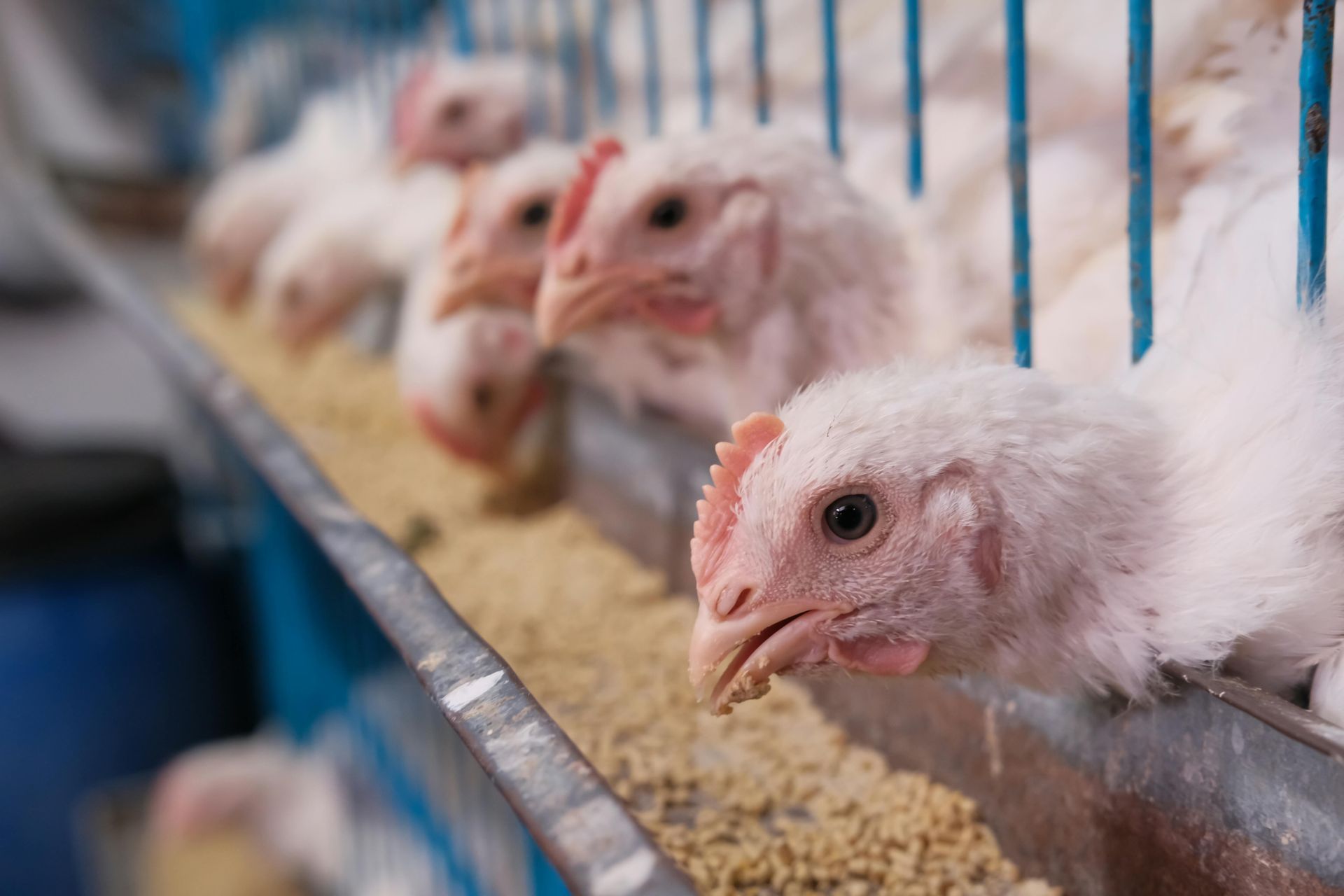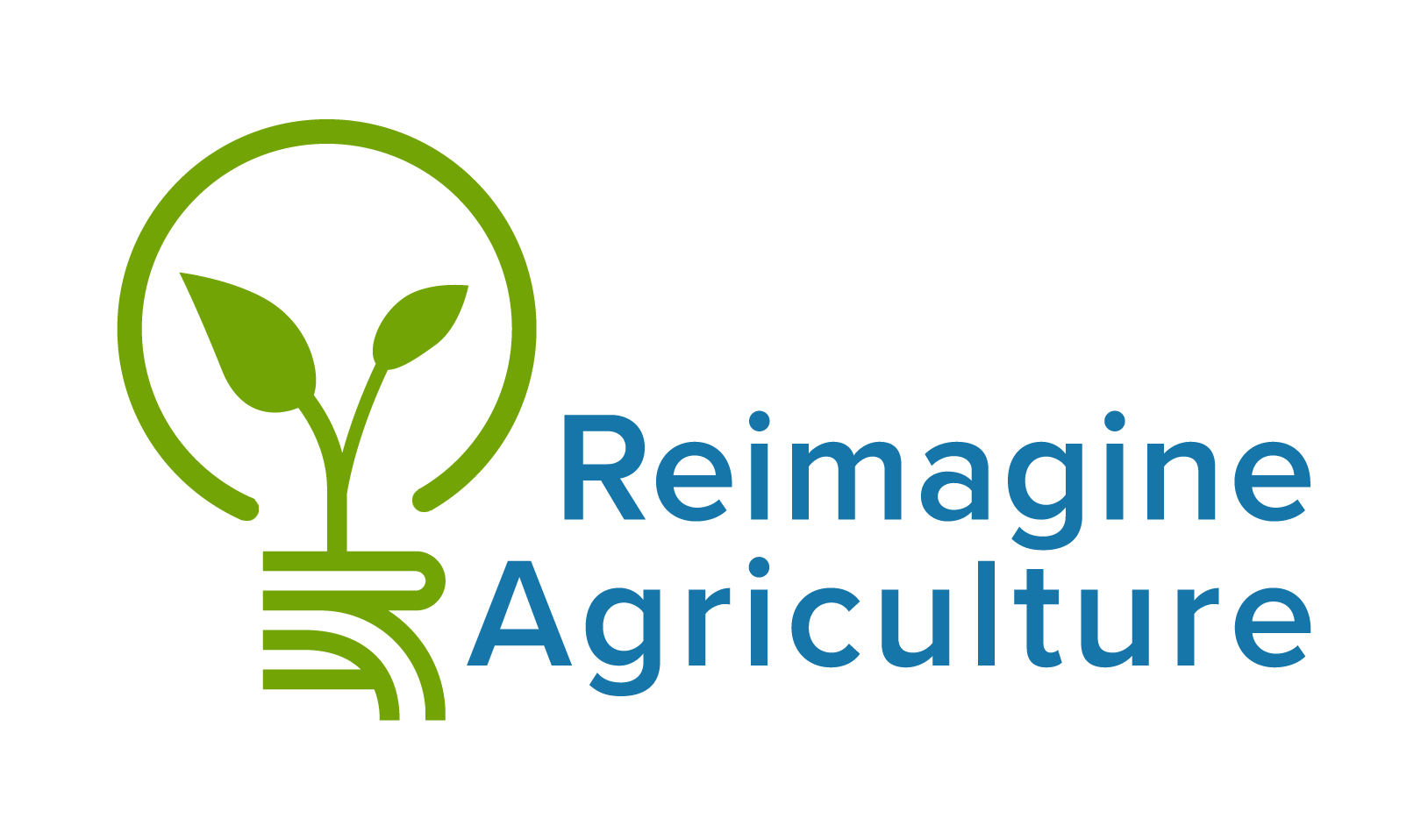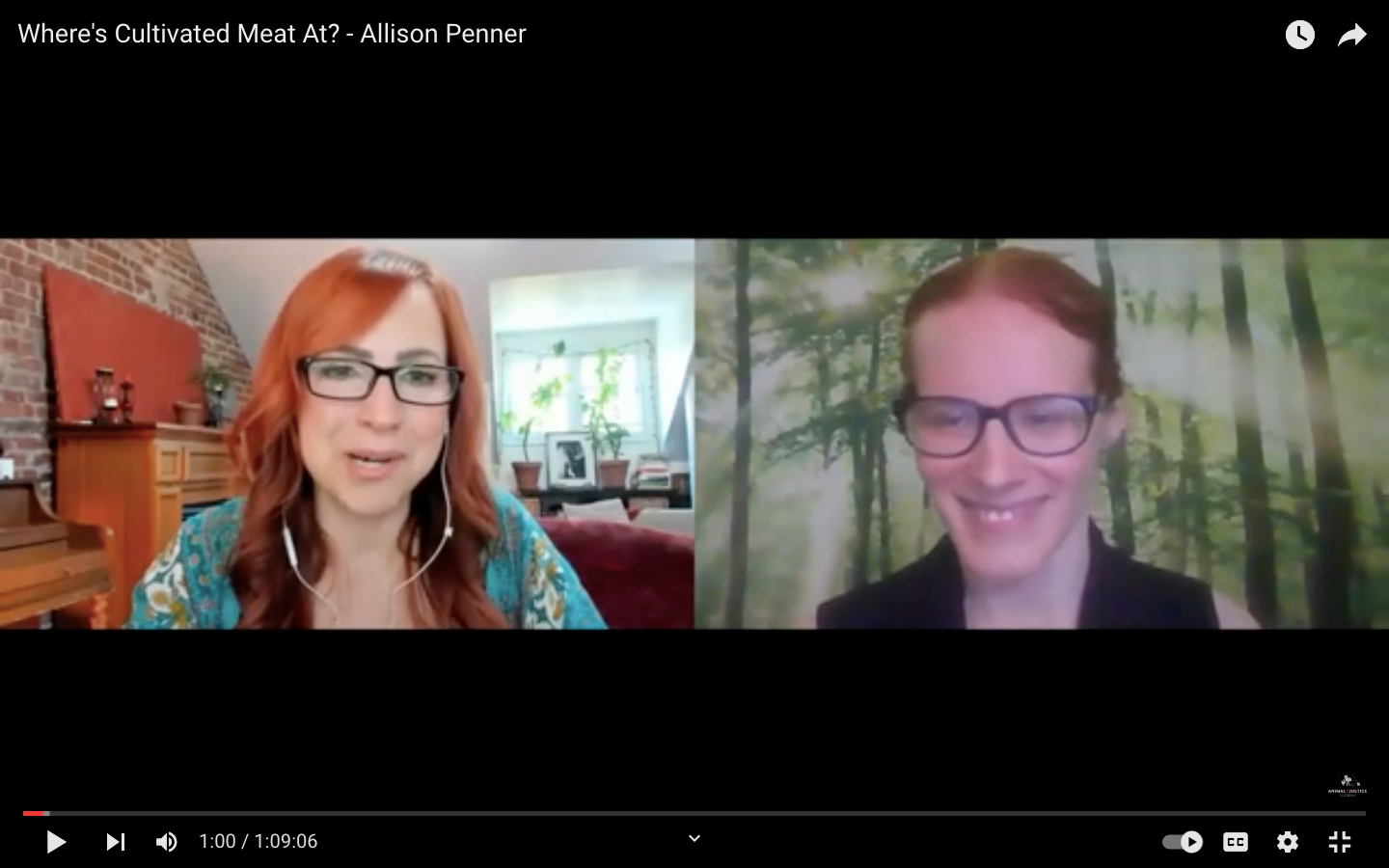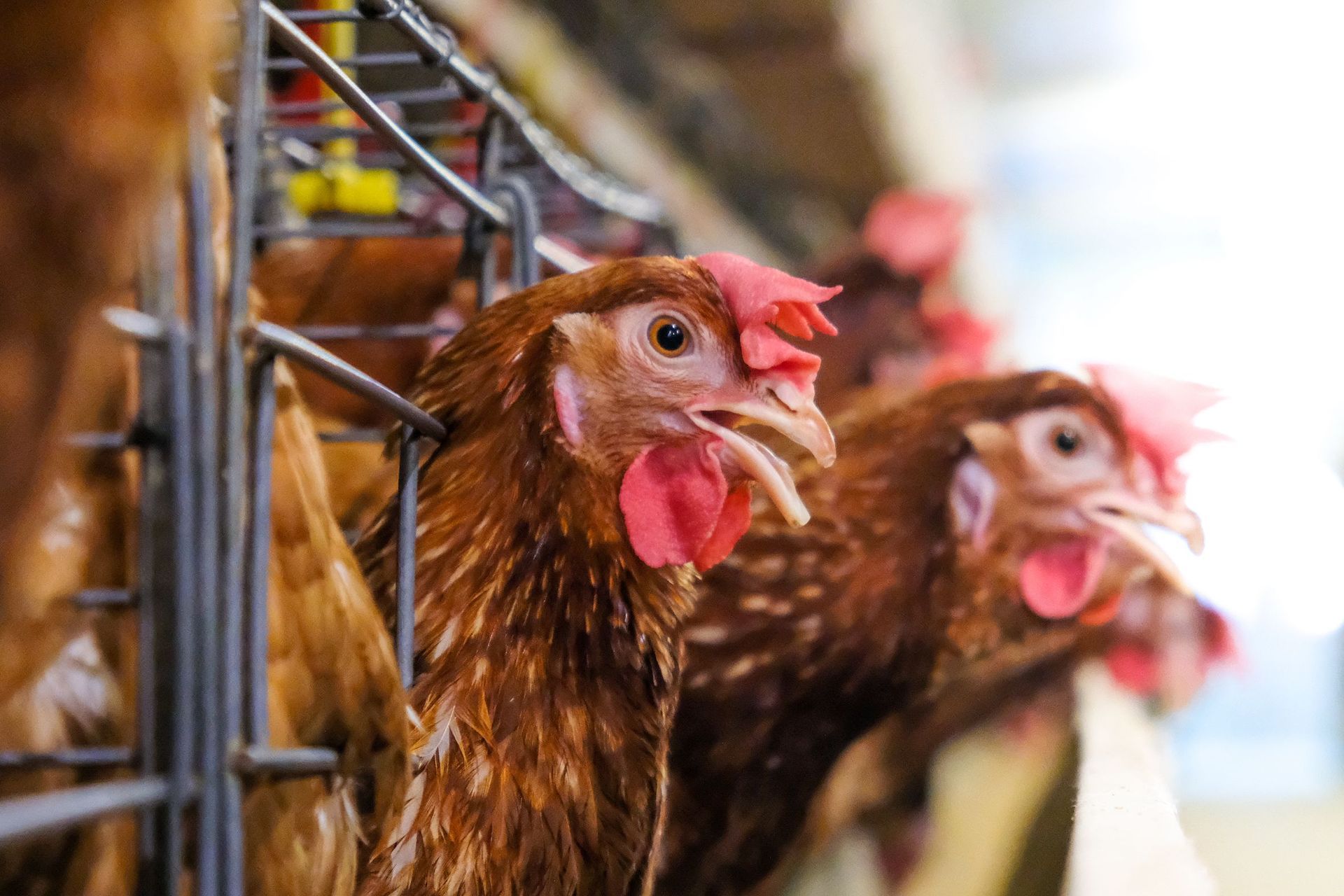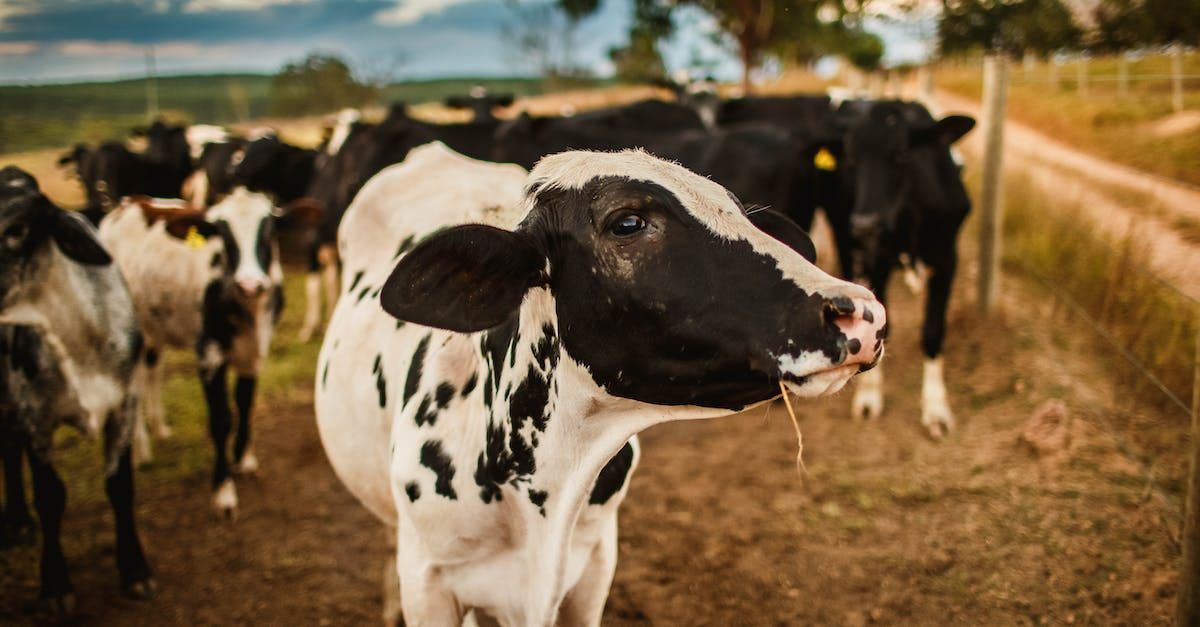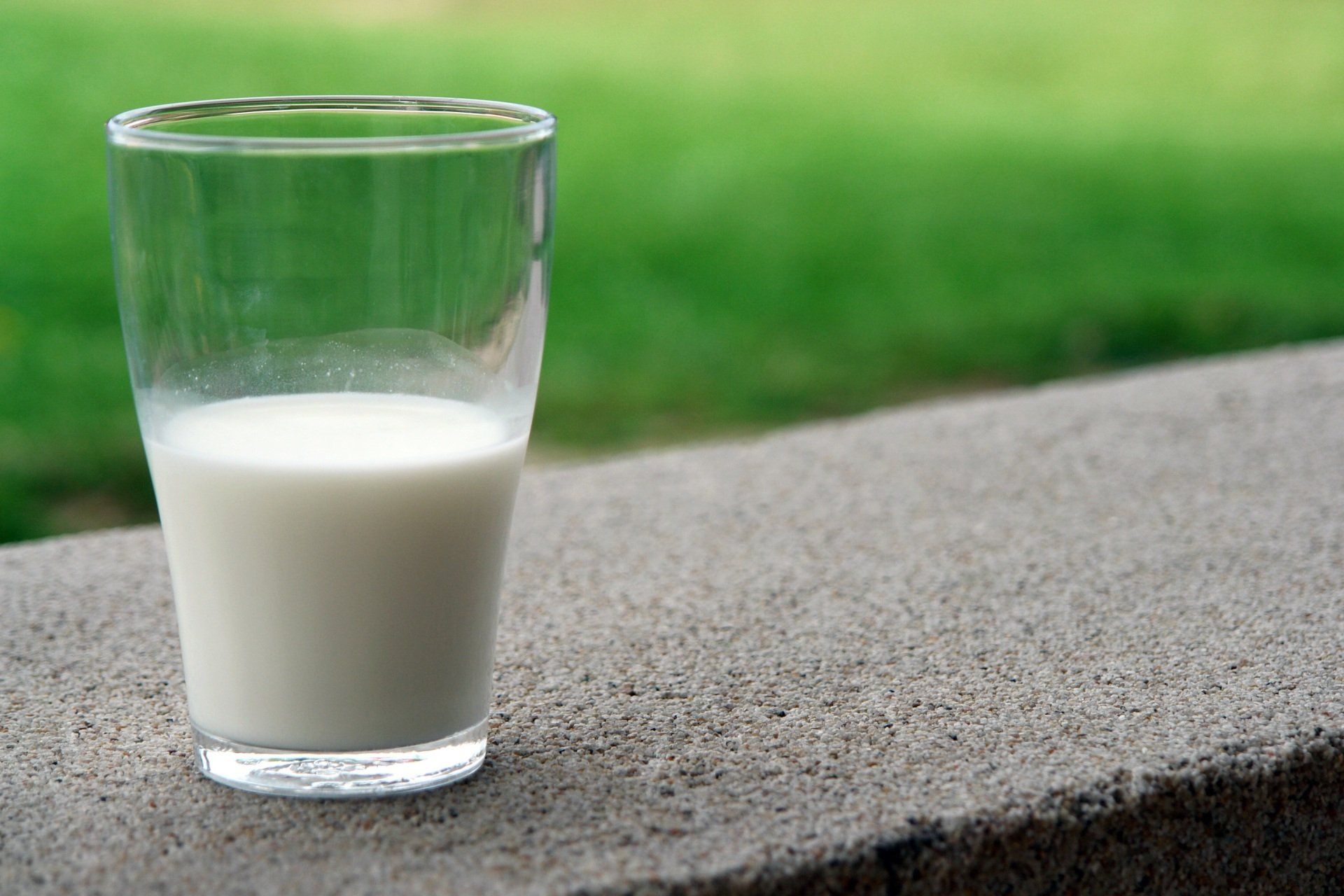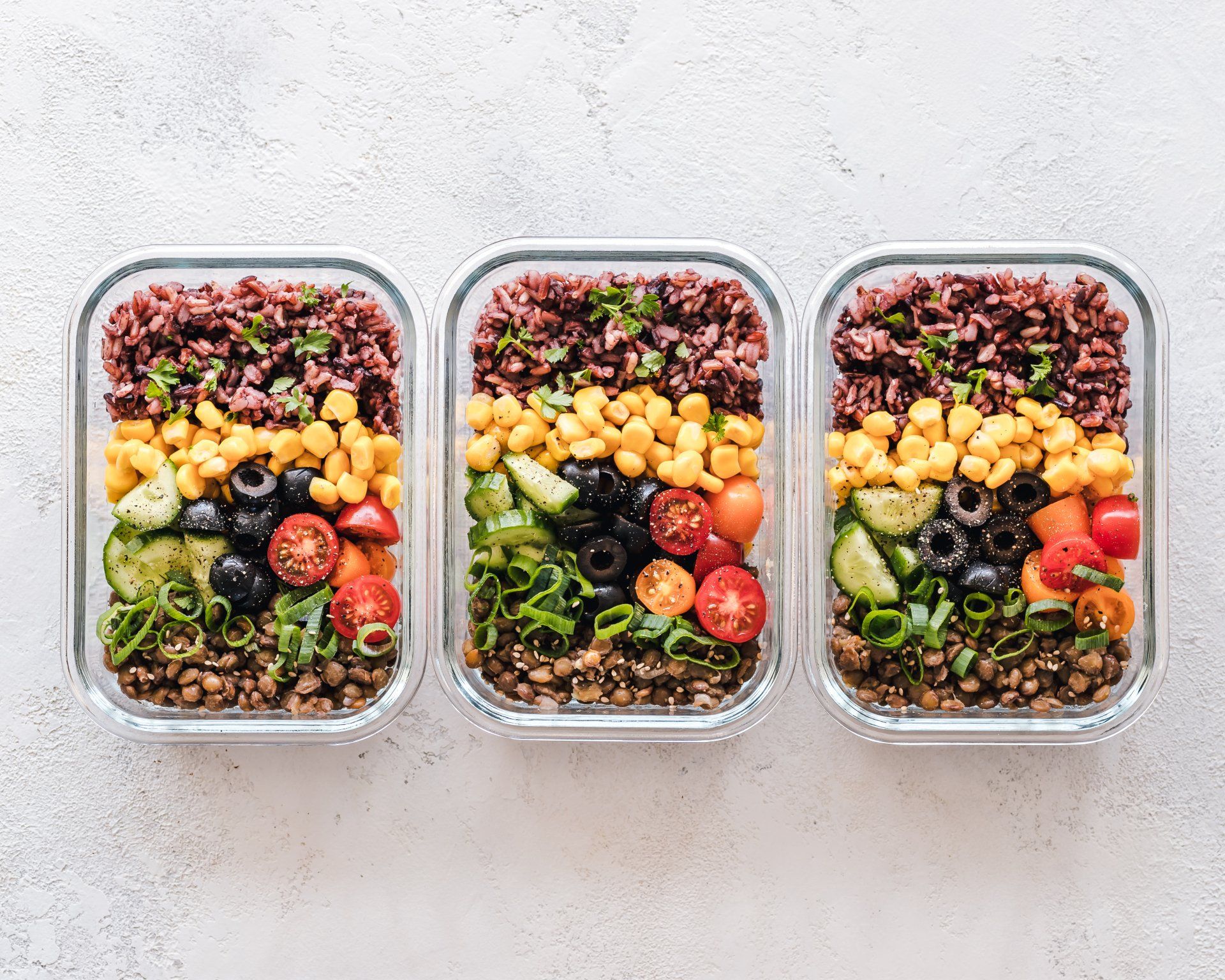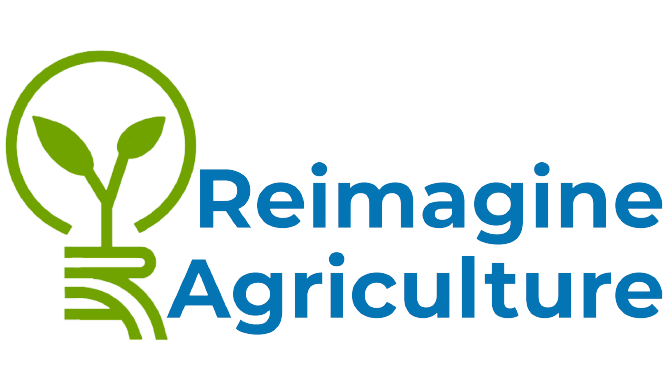Your Factory Farming Questions Answered
What is Factory Farming, and how is it affecting our health, our environment?
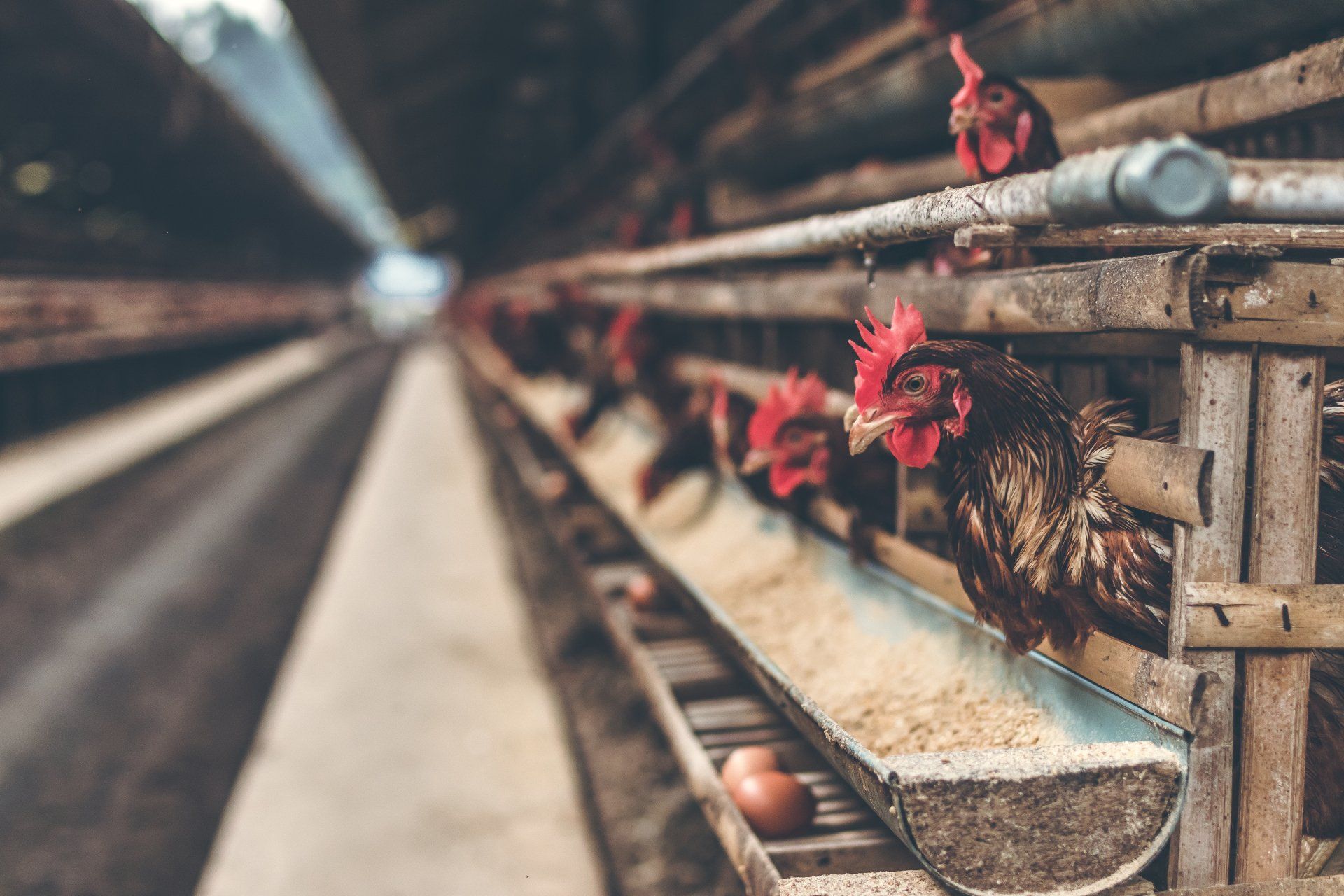
Ever wonder where the bulk of meat, eggs, and dairy come from in North America? Most people consume animal products several times each day, requiring an industrialized system to raise enough livestock to meet the demand. Known as factory farming, the practices that are used to keep prices low and demand high involve treating animals more like parts of a machine than living creatures. If you've wanted to learn more about where your animal products likely come from, or have heard the term "factory farming" and wanted to learn more, you've come to the right place. We've complied a list of some of the most commonly asked questions on the topic of factory farming to give you an introduction to the topic, and maybe answer your particular, burning questions.
What is Factory Farming?
Industrial animal agriculture, or “factory farming,” is a type of intensive animal agriculture, the main purpose of which is to maximize profits while minimizing costs at every level.
Is there Factory Farming in Canada?
Contrary to popular belief, factory farming is rampant in Canada. Canadians have this notion that farmed animals in Canada live freely on big fields, are able to spend their days grazing, playing, and napping in the sun, with a big red barn propped up on the hill in the background. There is a reason why Canadians think this: it's what we’re told and shown from an early age by the industry itself. Unfortunately, that’s not the case for the vast majority of animals that are raised and killed for food in Canada.
Given that only 1% of Canada’s population are farmers, and that the Canadian agriculture industry produces and slaughters over 800 million land animals annually, there is simply no way to accomplish this level of output without using intensive methods and practices.
Is Factory Farming Ethical?
Boy, that's a good question. This one is going to take a bit of explaining.
Unfortunately, there is no proactive monitoring or inspecting of farm facilities in Canada–inspections only take place after a complaint is made.
The reality is that intensive systems like this mean that animals can’t exhibit many of their natural, instinctive behaviors, which can cause tremendous psychological and physical suffering. For instance, chickens naturally engage in something called “dust bathing”, but because they are crammed together by the hundreds of thousands in massive sheds, they simply don’t have the space.
Chickens, cows, pigs, and other farmed animals are intelligent, exhibit a wide array of emotions, have best friends, and more. They have rich inner lives and a desire to live based on their natural instincts. Factory farming disregards all of that, and hence, is not an ethical practice. If we applied the same treatment to the dogs and cats we raise, love, and snuggle every day, Canadians would be aghast and outraged. But dogs and cats are not inherently different from chickens and pigs. In fact, pigs are far more intelligent than both dogs and cats. So why is it ok that we treat pigs in this manner but would never let the same happen to dogs and cats?
Not only is factory farming cruel to the animals, but it’s also detrimental for farmers. Factory farmers typically work for a handful of very powerful companies, like Tyson Foods or Purdue. These large corporations are vertically integrated, which means that they control production at every level, from feed to raising the animals, to slaughter, to selling the final product. They contract out to farmers to raise the animals on their behalf. Typically, these contracts are extremely rigid and difficult to get out of. These companies own all the animals being raised, however, it’s up to the farmer him or herself to take out the often million dollar+ loans to get a farm started. The farmers also have to pay for consistent upgrades to farms out of their own pocket. On top of that, farmers are only paid for the animals that make it to slaughter alive. Unfortunately, due to the horrendous conditions on farms, millions of animals die before making it to slaughter. That comes out of the farmer's pocket. Farmers in these circumstances are often referred to as indentured servants because they are at the complete mercy of the large corporation for which they work. It is extremely difficult to get out of contracts, and farmers often don’t talk about these difficulties because these corporations are so powerful and can take everything away from them at any time. Often, once farmers are able to break free from their contracts and move on, they are left with hundreds of thousands of dollars, or more, in debt, while these large corporations continue to make more and more money every year.
Working on farmers like this is also hazardous to human health, due to repetitive labour, inhaling toxic chemicals, and the severe stress and burnout that comes from running a mega farm.
Is Factory Farming Illegal?
Factory farming is not only legal but is propped up by a tremendous amount of subsidies that taxpayers pay for, marketing boards, and more. It is an extremely well-funded and powerful industry. There is a reason a chicken breast is so cheap. What consumers are paying for is not the true cost of chicken. Other costs are externalized and passed on to the consumer.
What is illegal in many provinces, however, is documenting what happens on these farms. Ag-gag laws, prevalent in many American states, have made their way to Canada in recent years. Ag-gag laws essentially make it illegal for individuals to document the treatment of animals on farms. This makes reporting and winning a case of animal cruelty extremely difficult and arguably impossible. The industry does not want Canadians to know what happens on factory farms.
Is Factory Farming Bad For The Environment?
We can no longer deny the devastating effects of factory farming on the environment. Here are just a few of the ways factory farming negatively impacts the environment:
- Methane/CO2 production - industrial animal agriculture is the world’s leading contributor to greenhouse gas emissions (GHG). In fact, factory farming accounts for 37% of methane (CH4) emissions, which has more than 20 times the global warming potential of CO2.
- Water pollution - Factory farms are huge polluters when it comes to local waterways. For instance, manure contains traces of salt and heavy metals, which can end up in bodies of water and accumulate in the sediment, which concentrates as it moves up the food chain. An incredible amount of manure accumulates on factory farms. Many farms accumulate this manure in massive ponds and then spray it over the land (they have to do something with it!). However, when manure is repeatedly applied to farmland, it can cause dangerous phosphorous and nitrogen levels in the local water supplies, which destroys aquatic life.
- Water usage - A tremendous amount of water is needed to produce animal-based proteins. For instance, “The average water footprint per calorie for beef is twenty times larger than for cereals and starchy roots. When we look at the water requirements for protein, it has been found that the water footprint per gram of protein for milk, eggs and chicken meat is about 1.5 times larger than for pulses.” Take a look at our post which shows that one beef burger requires the same amount of water as 20 showers! The reality is that 3 in ten people worldwide lack safe drinking water, and one of the main causes of water depletion worldwide is animal agriculture. One-third of the world’s water consumption is for producing animals products.
- Deforestation and biodiversity loss - The sad reality is that animal agriculture is a significant driver of deforestation, in particular, cattle ranching. Cattle ranching (and the soy required to feed the cattle), is the biggest cause of deforestation in almost every Amazon country. Around 90% of the soy grown is used to feed animals to produce meat and dairy products. This deforestation, in addition to being a huge driver of biodiversity loss, also releases nearly 350 million tons of carbon into the atmosphere every year.
Is Factory Farming Sustainable?
Factory farming is not sustainable and there are a lot of reasons why:
Land use: A tremendous amount of land is used, worldwide, to grow crops to feed animals, with the end goal of producing meat and other animals products. This is an incredibly inefficient model for a few reasons, mostly due to the fact that animals are inefficient converters of food. Producing crops (soy, corn, wheat, etc.) for animal feed is many times more resource-intensive than using crops for direct human consumption. For example, animal agriculture provides just 18% of calories but takes up 83% of farmland.
- The sad reality is that billions of people go without food every single day. Additionally, “Undernutritition causes 45% of child deaths, resulting in 3.1 million deaths annually.” Globally, farmed animals consume five times as much food as all human beings, but only provide 18% of calories and 37% of protein. Focusing just on the United States for a moment, if farmers took all the land currently used for animal agriculture and used it to grow plants instead, “they could sustain more than twice as many people as they do now, or an additional 390 million hungry mouths.”
Food waste - Animal agriculture is the ultimate form of food waste and is responsible for the most losses of all harvest crops on the planet. This is because most crops used to feed farmed animals are lost, meaning they are used by the animals for sustenance and energy, and don’t end up being passed along to the end consumer. So, there is a tremendous amount of waste before these products even make it into the homes of the consumer, however, it doesn’t stop there. As we know, household food waste is a big problem, especially when animal products go to waste (considering how inefficient these products are in the first place).
Is Factory Farming Necessary?
Factory farming is not necessary. In fact, “Avoiding meat and dairy products is the single biggest way to reduce your environmental impact on the planet, according to the scientists behind the most comprehensive analysis to date of the damage farming does to the planet.” Another study suggests that “Eliminating animal agriculture would result in a 75% reduction in overall farmland use and still feed the world.” Not only is factory farming unnecessary, but it’s negatively impacting the environment, human health, food security, and much more.
How Does Factory Farming Affect Human Health?
Huge industrial farms and their business practices affect far more people than you might expect. You don't have to be eating the meat/dairy/eggs from factory farms to be impacted by their effects.
Racial/socio-economic equity/living near factory farms
While working on a factory farm is no joke, living near one isn’t, either. Living near farms can have the following detrimental impacts on human health:
- Pollutants can harm child brain development: “According to the EEB, particle matter (PM) and ozone from factory farms can impact brain development. Research published in the journal of Translational Neuroscience shows that high levels of both pollutants can adversely affect the neurological development of children, leading to a higher presence of neural, behavioural, and cognitive changes.”
- Air pollution from factory farms can also damage the nervous system in adults, which can lead to increased anxiety.
- Living near a factory farm also means you have a higher chance of developing asthma and other upper and lower respiratory tract diseases if you live near a factory farm.
- You also have an increased risk of cardiovascular disease if you live near a factory farm, particularly is you’re elderly or have other ongoing health issues.
- Sadly, these pollutants can also damage the reproductive system and cause birth defects.
- You are also at an increased risk of diabetes, even without a family history of diabetes.
The sad reality is that often folks of lower socio-economic status live near these facilities because land and rent is cheaper (these facilities also bring down the market value of the surrounding area, which is not good for homeowners). This means that those already facing financial hardships also have to face these negative health consequences. They often have nowhere else to go and are at the complete mercy of these mega-farms.
Zoonotic diseases
One need look no further than the covid-19 pandemics to see the potentially deadly effects of animal-borne diseases on humans. Covid-19 jumped from a pangolin to a human in a crowded wet market in China. But covid-19 is not the exception. In fact, the U.S. Centers for Disease Control and Prevention states that “three out of every four new or emerging infectious diseases in people come from animals.” From bird flu to swine flu to mad cow disease, the way we treat, raise, and slaughter animals can not only have detrimental effects for the animals in question but can also be a severe risk to humans. According to Canada’s National Observer, “Farmed and caged animals create the perfect breeding environment for zoonotic diseases, and not just in other countries. Canadians need to be much more concerned about the potential for future pandemics stemming from our own food system.”
E. coli and salmonella are also big risks to human health–e. coli coming from animal feces (which can contaminate water, meat, and vegetables), and salmonella coming from chicken that has been improperly cooked.
Antibiotic use + resistance
Naturally, when you cram thousands of animals together in very tight spaces, you create breeding grounds for diseases. Antibiotics are used en masse on factory farms to counter these low welfare standards. The overuse of these antibiotics contributes to the rapid rise and spread of bacteria that are resistant to medicines typically used to fight infections. These resistant bacteria are called “superbugs” and make it into our waterways, the soil, and even into the meat and dairy later to be consumed by humans. This alone can cause life-threatening illnesses and an inability to use antibiotics to treat various illnesses.
